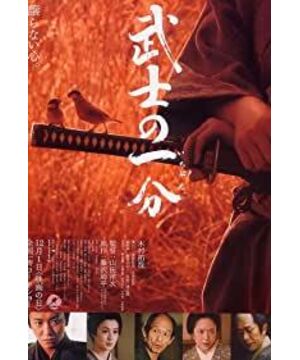sees Kimura again after a long-lost Japanese idol drama, and almost no trace of youth can be seen.
Mimura's only duty as a poisonous servant is to taste food for the domain lord every day.
It was a boring, time-killing job, and Mimura, a samurai, was a little tired of it.
He wants to open his own sword shop to teach children about swordsmanship.
The film begins with Mimura and his beautiful wife having dinner together and chatting about everyday things.
The camera swept across the backyard, and the shadows in the sun were mottled.
However, he was poisoned. Although he saved his life, he was blinded.
The snobby relatives asked her wife to ask for help instead of bothering them.
So the wife was forced to seek help from a well-known fan, and was forced to commit herself to him.
The gossip was heard by Mimura, who had just calmed down and was about to start living through the rage, divorced his wife, and swore revenge.
Mimura's master told him that you have only one way to win, that is, you are determined to die, and the other party wants to survive.
I thought I would see a hearty and fierce battle of revenge, and how a blind samurai strives to become a generation of swordsman masters. There are none of these, which is a bit unexpected.
All you see is clumsy Kimura practicing his swordsmanship there almost in vain.
The scene of the duel was beautifully shot. When Pantou came, Sancun was standing with his back to the sun. The sun shone on Sancun's head, a beautiful arc of light, his hair blown by the wind, and Sancun who was talking with his head sideways. Without turning his head at all, he scolded Fantou harshly. That scene was tragic, but also penetrating. The master said that if he died, he would be born again. It was the same. At this moment, Sancun was obviously beyond life and death. The high reeds by the river showed a withered yellow, a gale passed by, and the strange sound of musical instruments.
At the beginning, the temptation from both sides, Sancun's clumsiness and lack of direction, gave Fantou certainty.
There was a sudden gust of wind, and Sancun just stood in the wind, silently dying and then living. He thought that Fantou was opposite him, but Fantou had already jumped on the top of the stable, wanting to make a noise. He first dropped a stick in the other direction. Sancun immediately turned around, and Fantou jumped down at the opportunity. Between the lightning and flint, Sancun quickly adjusted his direction and cut off Fantou's arm with a sword.
A duel that was almost mortal, but because of Mimura's desire to die and Fantou's cunning, it achieved another result.
Can not help but feel embarrassed.
I am more and more impressed, the Japanese like simple and not complicated things, this samurai, the entire duel is only in the last moment. The filming is also deliberately clumsy, and Crouching Tiger, Hidden Dragon are really two extremes of things.
But I don't think it's a question of who is good and who is bad. The director has a simple insight into the extension of the feelings behind it. This is the reason why this type of film is good.
As the English title of the film suggests, this is just another movie about love.
If there is no blindness and the betrayal of his wife, there is no Sancun's heart to die.
This story is probably a mediocre ending.
This is the paradox of life. When you can't let go, you are actually lost.
And when you are desperate, those hopes are quietly planted in the corner,
and you will wake up after many years, and that is the beginning of everything.
It's just like the two levels of the earth, when there is no meeting.
View more about Love and Honor reviews











